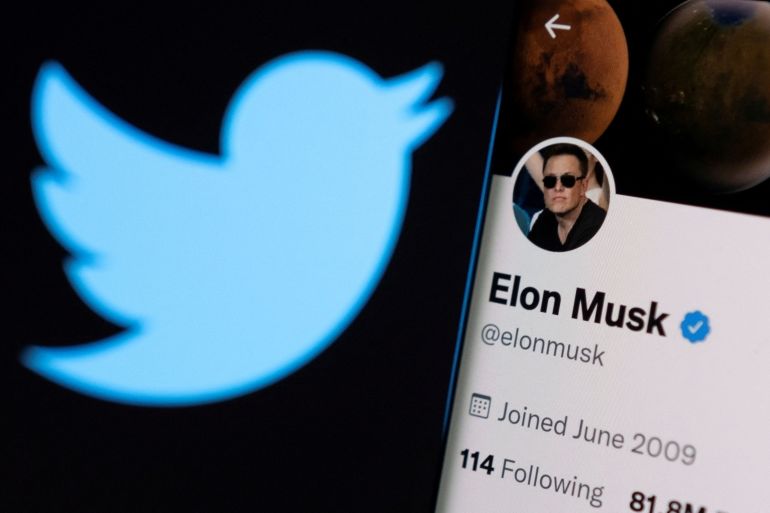Musk emerging as Twitter’s chief moderator before US midterms
Since taking over Twitter Elon Musk has directly engaged with people on the political right asking for looser rules.

Days after taking over Twitter and a week before the US midterm elections, billionaire Elon Musk has positioned himself as moderator-in-chief of one of the most important social media platforms in American politics.
Musk has said he will not make major decisions about content or restoring banned accounts before setting up a “content moderation council” with diverse viewpoints. But his own behaviour as a prolific tweeter has signalled otherwise.
Keep reading
list of 4 itemsAs Musk takes over Twitter, users test limits
Musk begins Twitter reign by booting CEO, top executives
Trump stands by his own platform as Musk takes over Twitter
He has engaged directly with figures on the political right who are appealing for looser restrictions, including a Republican candidate for Arizona secretary of state who credited Musk with enabling him to begin tweeting again after his account was briefly suspended Monday.
Musk even changed his profile to “Twitter Complaint Hotline Operator” – with a photo of himself when he was a toddler holding a telephone. But it is almost impossible for those outside of Twitter to know what strings he is pulling or whose accounts have been suspended: The company has stopped responding to media questions, except for the few that Musk answers by tweet.
Musk’s promised interventions started last week on his first full day as Twitter’s owner. A conservative political podcaster shared examples of the platform allegedly favouring liberals and secretively downgrading conservative voices – a common criticism that Twitter’s previous leaders dismissed as inaccurate. “I will be digging in more today,” Musk responded.
It continued when the daughter of Canadian psychologist Jordan Peterson, whose provocative critiques of “politically correct” culture and feminism are popular with some right-wing activists, appealed for Musk to restore her father’s account after a tweet about transgender actor Elliot Page that apparently ran afoul of Twitter’s rules on hateful conduct.
“Anyone suspended for minor & dubious reasons will be freed from Twitter jail,” Musk pledged. He had months earlier said in reference to Peterson that Twitter was “going way too far in squashing dissenting opinions”.
One of Musk’s first big moves was an open letter to advertisers – Twitter’s chief revenue source – promising that he would not let Twitter descend into a “free-for-all hellscape” as he follows through with his plans to promote free speech on the platform. And he has suggested asking users to pay $8 for a coveted verified blue check mark as a way to diversify revenue.
The check mark has been criticised as a symbol of elitism on the platform. But its primary purpose has been to verify that accounts in the public eye – such as politicians, brands and journalists – are who they say they are. It has been a tool to prevent impersonation and help stem the flow of misinformation.
But some still have their worries about Musk opening the platform to a flood of online toxicity that’s bad for their brands. General Motors has said it will suspend advertising on Twitter as it monitors the platform under Musk, and others are facing pressure to review their own plans. On Tuesday, more than three dozen advocacy organisations sent an open letter to Twitter’s top 20 advertisers, calling on them to commit to halting advertising on the platform if Twitter under Musk undermines “brand safety” and guts content moderation.
‘King of the platform’

Over the weekend, the billionaire posted – then deleted – an article that contained baseless rumours about the attack on House Speaker Nancy Pelosi’s husband. And much of his commentary in recent days has been a response to appeals from conservative voices.
In a text exchange with The Associated Press, Mark Finchem, the Republican running to become Arizona’s secretary of state, said his access to the platform was restored quickly after reaching out to Musk via his personal Twitter handle. Asked why his account was suspended, Finchem said, “Perhaps you should reach out to Elon Musk. We were banned for an unknown reason, we reached out to him and 45 minutes later we were reinstated.”
Finchem, who has questioned the results of the 2020 presidential election and was at the Capitol on January 6, 2021, has drawn national attention for his statements about election security and his ability to change election rules if he wins the state’s top election post next week.
Musk tweeted Monday evening that he was “Looking into it” in response to a complaint about Finchem’s apparent suspension. The complaint came from lawyer Jenna Ellis, who was a legal adviser to former President Donald Trump’s campaign. About 40 minutes later, Finchem posted a “test” tweet on his account, which was followed by a lengthier post thanking Musk for restoring his ability to use the site.
“Thank you @elonmusk for stopping the commie who suspended me from Twitter a week before the election,” Finchem wrote in the Tweet. “Twitter is much better with you at the helm.”
Jared Holt, a senior research manager at The Institute for Strategic Dialogue, said big social media companies have typically operated on the whims of their owners. But “that problem is especially glaring when somebody like Elon Musk takes the reins and kind of establishes himself as king of the platform, rather than an owner trying to run a coherent business,” Holt said.
Content moderation council
At the same time, Musk has sent mixed signals about his intentions. Despite overt examples of appealing to conservative calls and complaints about Twitter’s policies, there is also plenty of evidence that the platform’s policies on combating misinformation are still in effect.
Separately, Musk has defended Twitter’s continuing head of trust and safety, Yoel Roth, after some conservative users called for his firing over past comments expressing liberal views. Roth remained on the job this week after other top executives were fired or resigned. And apart from Musk, he appeared to be the chief public voice of Twitter’s content moderation, explaining that the company spent the weekend working to remove a “surge in hateful conduct” following Musk’s takeover.
“We’ve all made some questionable tweets, me more than most, but I want to be clear that I support Yoel,” Musk tweeted in response to a complaint from another conservative commentator. “My sense is that he has high integrity, and we are all entitled to our political beliefs.”
Some longtime Twitter observers have expressed scepticism about the effectiveness of Musk’s planned content moderation council. In part, that is because Twitter already has a trust and safety advisory council to address moderation questions.
“Truly, I can’t imagine how it would differ,” said Danielle Citron, a University of Virginia law professor who sits on the council and has been working with Twitter since 2009 to tackle online harms, such as threats and stalking. “Our council has the full spectrum of views on free speech.”
Citron said she was still waiting to hear if the council will be having its next meeting, scheduled for the day after the midterms.